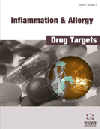
Microbial Immune Evasion Employing Suppressor of Cytokine Signaling (SOCS) Proteins
Cytokines mediate communication between cells of the immune system and are of crucial importance to induce an appropriately regulated immune response to invading pathogens. Cytokine receptor signaling has to be tightly controlled to balance anti-microbial and tissue-destructive effects, both of which are inherently associated with cytokinemediated inflammation. Suppressor of cytokine signaling (SOCS) proteins have been identified as intracellular, inducible feedback inhibitors which limit the signal magnitude of cytokines employing Janus kinase (Jak) and signal transducer and activator of transcription (STAT) pathways. Interfering with cytokine receptor signaling has been shown to be a promising strategy used by various microbial pathogens to evade otherwise detrimental immune responses. To this, microbes make use of a variety of different means. Recent reports now indicate that certain bacteria, viruses and parasites have also learned to use the host's inhibitory SOCS proteins for manipulating cytokine receptor signaling, especially to circumvent the actions of interferon. Progress in the field of microbial immune evasion mediated by SOCS proteins is discussed in this review. Modulating the host's SOCS system therefore could also be a promising new approach for molecular therapeutic strategies.
Keywords: Cytokines; SOCS; immune evasion; infection; innate immunity
Document Type: Research Article
Publication date: 01 September 2007
- Inflammation & Allergy - Drug Targets aims to cover all the latest and outstanding developments on the medicinal chemistry, pharmacology, molecular biology, genomics and biochemistry of contemporary molecular targets involved in inflammation and allergy e.g. disease specific proteins, receptors, enzymes, genes. Each issue of the journal contains a series of timely in-depth reviews written by leaders in the field covering a range of current topics on drug targets involved in inflammation and allergy. As the discovery, identification, characterization and validation of novel human drug targets for anti-inflammation and allergy drug discovery continues to grow, this journal has become essential reading for all pharmaceutical scientists involved in drug discovery and development.
- Editorial Board
- Information for Authors
- Subscribe to this Title
- Ingenta Connect is not responsible for the content or availability of external websites
- Access Key
- Free content
- Partial Free content
- New content
- Open access content
- Partial Open access content
- Subscribed content
- Partial Subscribed content
- Free trial content